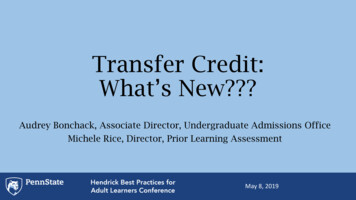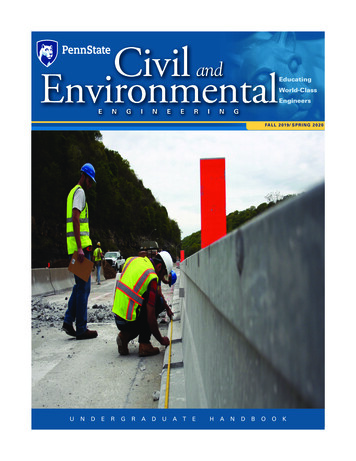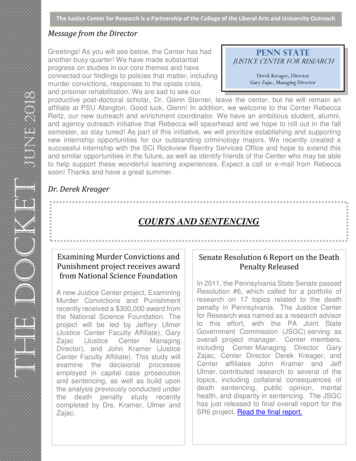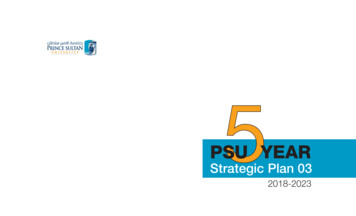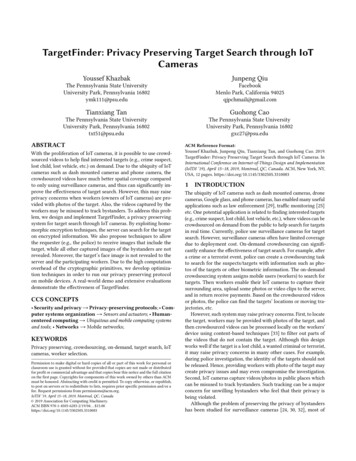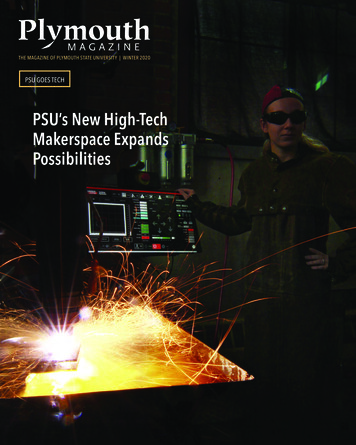
Transcription
THE MAGAZINE OF PLYMOUTH STATE UNIVERSITY WINTER 2020PSU GOES TECHPSU’s New High-TechMakerspace ExpandsPossibilities
As the year began, faculty, staff, and students shared a few oftheir visions of the future, from new pedagogical approachesand more engaged student life to athletic competitions,environmental goals, and reaching out to the wider world. Watchvideos on these and other topics at plymouth.edu/magazine.
Winter 2020 plymouth.edu/magazineEDITOR Peter Lee MillerMANAGING EDITOR Patrick GulloEXECUTIVE EDITOR Marlin CollingwoodDESIGNER Daphne Bruemmer ’98CONTRIBUTORSILLUSTRATORS PHOTOGRAPHERSRodney Ekstrom ’09GMackenzie Fullerton ’17Brian Gagnon ’05, ’09GChrista Hollingsworth ’15GJED Campus Initiative: A ProactiveApproach to Mental HealthBruce LyndesMorgan NavarroJack Roberts ’18Isidro Rodriguez3Gil Talbot ’76Cote’s Impact on Nursing ProgramAcknowledgedSummer Ascent Program Helps StudentsOvercome ChallengesJohn TullyPlymouth Magazine is published by the Communications &Marketing Office; Communications, Enrollment & StudentLife. 2020 Plymouth State University. Printed by PenmorLithographers, Lewiston, ME.OF NOTE New CESLife Group Is All About StudentsCover StoryNew Student Life Leadership, ProgrammingBret KulakovichShannon Griffiths ’17Peter Lee Miller2Richard FinkelsteinLori L. FergusonChris Kilmer ’99In this issue:PSU GOES TECHNew High-Tech MakerspaceExpands Possibilities page 78CAMS Is a New Option for Mathematicians9Q&A with Mathematics Professor EmmaNorbrothen Wright10PSU’s New Robotics Program Aims for theBig Picture4Profile: Associate Provost Ann McClellan11The I-93 Tech Corridor: A Vision for the Future5PSU ATHLETICS Jacob Scheinman ’19:Dreaming of a Professional Sports Career12Governor’s Cup Competition WelcomesHigh School Robotics Enthusiasts13Foreign Direct Investment16Q&A with Professor Matt Kizer18THE GREEN Plymouth State AlumniNews & Notes Upcoming Alumni Events Class Notes In Memoriam ExchangingVows ArrivalsComments to:Editor, Plymouth Magazine, Communications & Marketing,MSC 24, Plymouth State University, 17 High St., Plymouth, NH03264-1595; psu-mccs@plymouth.eduPlease send address changes to:University Advancement, MSC 50, Plymouth State University,17 High St., Plymouth, NH 03264-1595; (800) 772-2620;alumni@plymouth.eduAlumni may update their contact information online atgo.plymouth.edu/infoupdate.Please visit plymouth.edu/magazine for additionalphotography, stories, and video.Supporting responsible use of forest resources.Printed on Primalith Silk; 10 percent recycled,FSC-certified paper.On the cover:Michaila Sheehan ’20, an art education (K–12) major,at the controls of the University’s new plasma cutter.By working with high-tech manufacturing tools, PSUartists explore how art can be amplified or alteredby technology, and how creativity intersects with anindustrial world. Bret Kulakovich photo.New Career and Mentoring Features and Applications for Alumni and StudentsPremier Alumni & Student Networking & Mentoring PlatformOnline Hub for Student & Employer ConnectionsOne Stop for Career & dshakePlymouth State University plymouth.edu/magazine1
OF NOTE2New “CESLife” Group Is All About StudentsNew Student Life Leadership, ProgrammingCreating the finest collegiate learning experience for students is a truecollaborative partnership betweenall PSU stakeholders, and the University has combined several keyfunctions in a new arrangementthat strengthens the student focus.The Communications, Enrollment& Student Life (CESLife) group hasconnected internal and externalcommunications, allowing it torecruit and retain PSU studentsand provide diverse opportunitiesfor student engagement.CESLife is led by InterimVice President Marlin Collingwood, who joined PSU in2017 as director of Marketing,Communications & CreativeServices. He brings over 30 yearsof marketing, advertising, publicrelations, and political expertiseto his work. Collingwood’sextensive background includesleadership of marketing agenciesin Boston, New York, and the UKand the handling of reputationmanagement, strategy and implementation, public affairs, crisismanagement, political affairs,health care, travel and tourism,and large-scale events.“PSU is a very student-centered institution, and this newconfiguration keeps studentssquarely in focus from when theyfirst express interest in attendingall the way through to graduation,” explains Collingwood.“Though CESLife may be new,the logic behind it is part of along Plymouth State tradition ofputting students’ needs first andforemost. We’ve also formed aParent & Family Resources Teambecause we know that collegetoday is truly a family affair.”Visit plymouth.edu/ceslifeto learn more about CESLife’sprograms and areas of focus. “Plymouth After Dark” evening programs, new field trip experiences,and an enhanced Greek life program are among the highlights of PSU’srenewed Student Life Office. Director of Student Life Tevis Bryantand Assistant Director Kadie Dickson have instituted many new ideassince taking the reins this summer.Greek life has become more visible on campus, with new officespace in the HUB and coordination by a new Inter Greek Council,and Bryant is leading PSU’s locally based organizations throughnational affiliation. “I founded Psi Sigma Phi, Rowan University’sfirst multicultural fraternity, and I’ve been through the process andknow the benefits,” he says. “Our Greek community is changing, andwe’re providing current students with additional support, and byaligning with national organizations, PSU students are networked toa bigger world.”Increased late-night and weekend events have earned strongfollowings, and off-campus trips to Boston and New Hampshiredestinations are popular. Collaborationswith Residential Life, the EducationalTheatre Cooperative, the CounselingCenter, and Academic Affairs haveresulted in a great diversity of programs,and students are kept informed throughincreased outreach, including social mediaposts, which have increased by 100 percent.Student Life is also forging a new connection with the National Society of Leadershipand Success, the nation’s largest leadershiphonor society. Students with exceptional academic standing or leadership potential will benominated for membership. Plymouth Magazine Winter 2020Marlin Collingwood. John Tullyphoto.Kadie Dickson and Tevis Bryant during Move-In Day 2019. Morgan Navarro photo.JED Campus Initiative: A Proactive Approach to Mental HealthTransitioning into adulthood can bring big changes and intense challenges, and Plymouth State Universityis acting proactively to better serve students. PSU is partnering with The Jed Foundation (JED), a nationalnonprofit that protects emotional health and prevents suicide for our nation’s teens and young adults, in acollaboration now underway.In November, undergraduates participated in JED’s Healthy Minds Study, which provided a baseline onthe University’s programs, systems, and challenges related to mental health. A JED consultant subsequentlyvisited campus, met with student leaders, and reviewed the survey results with a dedicated task force.“This is the beginning of a comprehensive process,” says Interim Vice President Marlin Collingwood. “Aleadership team that involves every aspect of campus is working with JED to craft specific recommendations that we plan to implement.”The program is specifically designed for higher education and pays particular attention to the emotionalneeds of this population. “PSU is part of a complex, national trend of increased use of mental health services, and we’re responding to that need,” says Dean of Students Jeff Furlone. “Our ‘Stamping Out Stigma’student group is one of many ways that awareness is being raised, and we’re making students and staff moreaware of what to watch for when a peer may need help.”A JED update will be shared with the campus community early in the spring semester. The collaborationwill continue for the next three years and is provided via a generous grant from the JED Foundation. Whencompleted, PSU will be only the second certified JED Campus in New Hampshire.
OF NOTECote’s Impact on Nursing Program AcknowledgedAnnie Cote. Bruce Lyndes photo.The legacy of Annie Cote’spassion for nursing lives onat Plymouth State University.Though now retired from educating future nurses after close toa decade of teaching, the impactof her hard work and dedicationin laying the groundwork for theUniversity’s nursing programcontinues to be acknowledgedand appreciated.Geographically speaking,Cote’s personal nursing journeyhas been tied to Plymouth sincethe early days of her career. Beforejoining the very newly formedNursing Department in 2011, Coteworked in the emergency roomat Speare Memorial Hospital,both educating others in the ERand furthering her own studiesthrough a master’s program.Cote credits Mary Ellen Fleeger, former USNH associate vicechancellor, for her involvementin the PSU program’s creationfrom the ground up. Aftertouring Speare Memorial, Fleegerencouraged Cote to apply tobecome the first faculty memberin the department. Cote joinedthe PSU team and jumped headfirst into the complex process ofbuilding courses and curriculum.After Cote worked around theclock for six months, PlymouthState’s nursing program wasfully formed and functioning.Despite running into a variety ofsituational challenges, due in partto rules and requirements of theprofession, the program excitedlywelcomed its first cohort in 2012.This first class, made up mostlyof nontraditional students, wentout into the world and put itsskills and strengths to use thefollowing year.Cote has also experiencednursing from the patient’s perspective. In 2013, while workingtoward her doctorate, she sustained a neck fracture and cameface-to-face with the gravity ofher situation and how nursingfactors into the equation. “Thesupport I got while I was in thehospital and during my recoverywas amazing,” she says.More recently, Cote encountered former students who weretreating a friend at Concord Hospital. These PSU alumni were praisedby doctors and their fellow nurses,and Cote was delighted to see thecaring and empathetic nature thatshe had nurtured in them.“Annie is an authentic nursewith knowledge and skillsunparalleled by her peers,” saidJean Coffey, PSU director ofnursing. “Her contributions,from the bedside to the classroom, are truly lasting and we areso grateful for the wisdom shehas instilled in our faculty andstudents.”Cote’s impact on nursingat Plymouth State enduresbeyond the program itself, as sheestablished the Lillian FrancesMorrissey Annual Scholarshipto assist nursing students everyyear in achieving their academic goals. Named for Cote’smother, the scholarship honorsan extraordinary career thatspanned decades. A critical carenurse (just like her daughterwould go on to be), Mrs.Morrissey saved lives on thescene of the 1944 Hartford, CT,circus fire, one of the nation’sworst fire disasters.Cote retired from PSU lastyear but remains involved asa member of the PSU NursingDepartment Advisory Council,which explores ways to improveand complement nursingeducation in the North Country. She also volunteers withhospice patients, a cause thatshe is wholly dedicated to, as shepursues an End-of-Life DoulaProfessional Certificate. Coffey Honored by AmericanAcademy of NursingJean Coffey, PhD, APRN, CPNP,director of the PSU nursingprogram, has been inducted as afellow into the American Academy of Nursing. She is the onlynurse leader from New Hampshire to be so honored in the 2019class, and the action recognizesher extraordinary commitmentto the promotion of public healththrough evidence and innovation. Read the full story online atplymouth.edu/magazine.Summer Ascent Program Helps StudentsOvercome ChallengesHeather DiPiano ’23 is the kindof student people believe in.A police officer she knewin high school recommendedher for a job at a local deli, andHeather worked after school and10-hour weekend shifts to earncollege money. She heard goodthings about PSU, but her collegedream began to fade due to anunstable situation. She left hometo pursue her dream, and ratherthan dip into precious collegefunds, she stopped eating lunch.The deli owner intervened with meat, cheese, and rolls. “If you workhere, you’re family,” he told her. This crucial support helped Heather getover a very rough patch, and she eventually returned home.More than half of all PSU students are either firstgeneration or low income, and nine out of ten count ondonor support for scholarship and financial aid assistance.Higher education should be more than just a dream.The officer and owner both believed in Heather, and so doesPlymouth State. She benefited from the University’s Summer AscentProgram, which helps bright students who face great challenges acclimate to college life. Programs like this can be the difference betweencollege success or failure.More than half of all PSU students are either first generation or lowincome, and nine out of ten count on donor support for scholarshipand financial aid assistance. Please visit plymouth.edu/give to learnhow you can help our many deserving students. Heather DiPiano ’23. Mackenzie Fullerton ’17 photo.Plymouth State University plymouth.edu/magazine3
Shannon Griffiths ’17 and her former professor, Associate Provost Ann McClellan. Mackenzie Fullerton ’17 photo.Profile: Associate Provost Ann McClellanEvery so often, during a momentof contemplation in betweenmeetings, Associate Provost AnnMcClellan reflects on her days ofleading classroom discussions,usually one in Rounds Hall.Now an inhabitant of the SpeareAdministration Building, hernew position takes full advantageof her intimate knowledge ofteaching, the learning process,and the intricacies of student life.After a much-deservedyearlong sabbatical filled to thebrim with copious amountsof research, travel, and onlinejaunts through virtual stacksof scholarly books, McClellanmade the leap from Englishprofessor to academic leader. Aveteran member of the faculty,she received the Theo KalikowAward in 2010, the Distinguished Academic AdvisingAward in 2015, and both theDistinguished ScholarshipAward and Excellence in FacultyService Award in 2016. She also4Plymouth Magazine Winter 2020served as English departmentchair for six years and has beensignificantly involved in theadoption of the Integrated Clusters learning model.When I first heard thenews that McClellan would betransitioning from teaching toacademic affairs, I couldn’t thinkof a better fit for the job. Her passion for knowledge is palpable,a fact that quickly became clearto me as her student. McClellanis perfectly poised to continuemaking the great academicstrides that she’s always prioritized for PSU students.My bachelor’s is in English,and McClellan molded me intothe critical, detail-oriented, andanalytical individual that I amtoday. We’re bound togetherby the skills, strengths, andpersistent curiosity that we share,and I’m grateful for the guidanceand knowledge she bestowed.Not to mention, we both loveto read.McClellan has stepped boldly into her new role,collaborating with colleagues on topics such asfaculty development, community partnerships,program development, and faculty support.McClellan has stepped boldlyinto her new role, collaboratingwith colleagues on topics such asfaculty development, communitypartnerships, program development, and faculty support. Onekey responsibility is navigatingthe ebb and flow of class enrollment, making sure that courseshave enough seats and sections.Effective communication,problem-solving, critical thinking, and assessing an audienceare just some of the necessaryskills that McClellan taughtundergrads and that she utilizesin her current work.She reaches across disciplinesdaily to ensure that PlymouthState is continually workingtoward its vision of experientiallearning and providing the mostbeneficial academic experience,and she bridges the gap betweenEnglish professor and associateprovost with genuine humanconnection. Chats over coffeeand department-wide get-togethers afford her the opportunity tokeep up to date on programs andpersonalities across campus.An acclaimed SherlockHolmes scholar, McClellan iscurrently mapping out her latestbook, a deep dive into AfricanAmerican adaptations of thetopic. Ever learning and teachingin a multitude of capacities, sheintently presses on, advancingher field and the University as awhole. Shannon Griffiths ’17
ATHLETICSJacob Scheinman ’19: Dreaming of a Professional Sports CareerJacob Scheinman ’19 has beenaround sports his entire life. Someof his happiest early memories areset within the PE Center or on thePlymouth State Men’s BasketballTeam bus with his father, JohnScheinman, the Panthers’ headcoach from 1999 to 2007 and2008 to 2010 and currently PSU’sdirector of development.“I would play behind thebleachers—run around whilemy dad was leading practice,” hesays. “Sometimes I would shootaround or hang out in his office. Ijust loved being here.”The affinity for sports stuck,and Scheinman played football,soccer, basketball, and baseball,focusing on the latter two atPlymouth Regional High School.He enjoyed and was good atmath, but in the back of hismind he knew that sports washis passion.After more than a year in PSU’smathematics program, Scheinman discovered he didn’t have thesame fondness for the subject ashe did for athletics. The decisionto change majors was obvious.“Even before high school Ialways thought I would end up asa sports management major,” saysScheinman. “I ended up exactlywhere I thought I would be.”Scheinman’s dream to work atthe professional level came aboutshortly after making the change,though deep down he knew healways wanted to pursue that path.“As a sports managementmajor, I wanted to work in athletics at the highest level I could.”Scheinman took a first stepin that direction as a summerintern at Celtics Camps, a youthbasketball camp directly affiliated with the Boston Celtics. JoeAmorosino ’62, a 2004 inducteeinto the Plymouth State AthleticsHall of Fame, is the program’sdirector and general manager.Amorosino was on campus forthe 2018 Hall of Fame inductionceremony, and when he heardthat Scheinman was looking toget into professional sports, hewas more than happy to offer aninternship opportunity.“I was really excited,” saysScheinman. “I knew it couldhelp my dream of getting intoprofessional sports. My job wasbasically to follow Joe and absorbas much as I could from him.”Scheinman was charged witha multitude of tasks, includingtaking inventory, distributinggear to staff members, coordinating camper evaluations withthe multiple camp directors, anddistributing camper medals. Theday-to-day work was fun, but thesummer’s highlights include lifetime memories acquired in thebrand-new, 160,000-square-footAuerbach Center, a training facility for both the Celtics and theBoston Bruins and headquartersof New Balance.He saw Celtics star GordonHayward working out daily, methead coach Brad Stevens, satthrough press conferences forfree agents Kemba Walker andEnes Kanter, and got a close lookat the Larry O’Brien Trophyfrom the team’s 1984 and 1986championships.In a world where who youknow can make the difference,Scheinman hopes his connections will prove useful as hepursues his professional sportscareer dream. Chris Kilmer ’99Plymouth State Hall of FamerJoe Amorosino ’62 with JacobScheinman ’19 and the 1984 NBAchampionship trophy at CelticsCamps—a youth basketball campaffiliated with the Boston Celtics.A MEMORABLEHOMECOMINGOfficial Boston BruinsAnthem Singer ToddAngilly ’99 wowsPanther Nation. Visitplymouth.edu/magazinefor videos detailing thedown-to-earth musicmajor’s love for PSUand his star-spangledHomecoming rendition.John Tully photo.Plymouth State University plymouth.edu/magazine5
PSU GOES TECHPSU GOESTECHIs the North Country fertile groundfor the next Silicon Valley? Visionariessee potential, with PSU playing thepivotal role of academic hub. Dreamsof the future are supported bytoday’s high-tech realities, includingthe University’s new robotics andapplied mathematics disciplines, anda new, state-of-the-industry facilitycomparable to those of the nation’stop technology institutions.STORIES BY PETER LEE MILLER.MACKENZIE FULLERTON ’17 PHOTOS.6Plymouth Magazine Winter 2020
New High-Tech “Makerspace” Expands PossibilitiesPlymouth State’s new “makerspace” in the Draper & Maynardbuilding boasts state-of-theindustry equipment thathas students dreaming big:self-driving snowmobiles, a“mesh network” (or meshnet) toboost and extend Wi-Fi sensors,electronic car motors, and largemammal prosthetics are amongthe early ideas. Faculty, staff,and students of all disciplinesare welcomed to the facility afterattending general safety workshops and specific sessions on 3Dprinting and laser cutting. Themakerspace is a regional resource,and plans call for public access,including opening it to localindustries over the next year.The facility’s capabilitiesrepresent a paradigm shift inmanufacturing, according to BretKulakovich, PSU’s coordinatorfor academic spaces and openlab design. Kulakovich designedthe makerspace and has led theUniversity’s conceptualizationthrough work with campusconstituencies. “Methods for supplying consumer goods are on thecusp of great change, as more andmore fabricating can now takeplace closer to the end user,” hesays. “Our new makerspace bringsthese exciting capabilities to PSU.”Kulakovich illustrates hispoint by using a commonhousehold item as an example.When a Tupperware top needsreplacing, under the currentsystem, thousands and thousands of replacements must beproduced at factory scale, andships, planes, railcars, and tractor-trailers then make deliveriesof finished goods worldwide in alogistical symphony.An alternative manufacturingstrategy would be to produce asingle top at a location nearby,or perhaps even in the end user’shome. Such is the premise of aplasma table, one of several hightech makerspace machines.“We’ve got a manufacturing-based culture that’s over100 years old, where we massproduce things,” says Kulakovich.“The production line did a hugeamount for absolutely everyone,knocking out cars and insulinand other drugs, but we’re gettingto the point where that strategydoesn’t work so well anymore.We make lots of products thatpeople never buy and that windup in landfills.”The plasma table is part ofan impressive equipment arraythat is giving students manynew opportunities. Betweensubstantial, essential renovationof the historic Draper & Maynard Building’s first floor andpurchase of new equipment,the makerspace represents a 1million upgrade. As PSU’s newestOpen Laboratory, it’s a place forlearning, experimenting, andcollaborating with other majors,businesses and nonprofits, andother community partners. Thefacility provides an extraordinaryopportunity for students to workin cutting-edge technology acrossthe entire spectrum of additivemanufacturing and design.The space accounts for over2,000 square feet on D&M’s firstfloor, including an area devotedto PSU’s new Electromechanical Technology and Robotics(EMTR) discipline. Plans call fordedicated classrooms, computerlabs, and additional fabricationspace on D&M’s fourth floor.“We’ve brought to bear a widevariety of equipment, and therereally isn’t anything else like this,”says Kulakovich. “It’s a uniqueand broad facility comparable tothose of leading institutions suchas Harvard and MIT.”Jess Sullivan ’20 is the makerspace’s student fellow. Theinterdisciplinary studies majorhas many PSU activities to hiscredit, including founding theUniversity’s Creation Technology& Hacking Club and printing3D topographic reliefs for thegeography department, which hepresented with other members ofthe PSU community at the American Association of Geographers2019 annual meeting.“The makerspace is reallygoing to provide the technologyto let our students expand thescope of what’s possible inour theatre productions,” saysBob Bruemmer, PSU’s interimmanager of theatre operations.“The tools will allow us togenerate scenery more quicklyand accurately and add a level ofcomplexity that we haven’t hadbefore. For example, the ShopBot lets us accurately generateBret Kulakovich, Digital Creation Technologist Erika Rydberg, and JessSullivan ’20 have been instrumental in launching the makerspace.Sullivan sees the phenomenonof a makerspace as a brick-andmortar extension of the now veryrefined Open Source Software(OSS) world, in which individualscan modify and share publiclyaccessible resources. “The potential value of the D&M makerspaceas a scholarly and financial asset toPlymouth State is both large andsensitive enough that my SeniorSeminar focus is entirely on forming a proper white paper detailingmeans to its success,” he says.Along with EMTR students,the makerspace will be busy withstudents from other Clustersworking on a variety of projects,including physical computing,health care, theatrical automation, environmental sciences, andhydroponics, among many otherareas of interest.multiple pieces in a short amountof time, the iron worker will helpus quickly build scenery piecesand curved railings, and 3Dprinters will be great for customand specialized props. We arevery excited about what the makerspace will allow us to do.”From computer-controlledcutting of wood, plastic, andmetal to laser-sharp detailing,3D printing, and bending andshaping of steel plate and piping,the makerspace will endow PSUstudents with experience andknowledge that may lead tomany high-tech career options.Visit Plymouth Magazine onlineat plymouth.edu/magazinefor a full list of the facility’sequipment and capabilities, ormakerspace.plymouth.edu formore information. Plymouth State University plymouth.edu/magazine7
PSU GOES TECH“CAMS” Is a New Option for MathematiciansThe federal government hiresmore mathematicians than anyother employer, so wouldn’t itmake sense for undergraduatemath students to study ethics? Orfor the legions of number-crunchers involved in psychologicalresearch to learn about Maslow’sHierarchy of Needs?Insights like these haveprompted a new option for PSUstudents who previously mayhave considered double-majoringor minoring with math andanother subject. The value ofinterdisciplinary studies, coupledwith résumé-building opportunities for experimental design anddata gathering, are at the core ofPlymouth State’s new Computational and Applied MathematicalSciences (CAMS) discipline.While applied math isbecoming more popular at thegraduate level, the vast majorityof undergraduate math programstake a traditional route that prepares students for graduate work.Programs at Brigham YoungUniversity and the University ofChicago are among a handfulnationwide that are similar toPlymouth State’s new offering intheir opportunities for appliedwork, though their curricularrequirements are made upentirely of computer science andmath courses. The University’snew program is unique in thatit more evenly distributes itscoursework across other fields.“This is what a ‘Cluster major’can be; a partnership with otherdisciplines within the Cluster,”explains Professor Emma Norbrothen Wright, who chairs thenew discipline. Math coursesaccount for half of the CAMSrequirements, and computerscience courses for a quarter. Students can choose their remainingenrichment options from otherExploration and DiscoveryCluster disciplines, includingbiology, chemistry, meteorology,and psychology, as well as fromcriminal justice of the Justice andSecurity Cluster.These other disciplines providestudents with experience in particular fields where mathematics andcomputer science can be applied.CAMS graduates will be equippedwith the background to properlyimplement a wide range of highlyapplicable skills, which will enablethem to serve in a variety of jobs inan evolving economy.“Math applies to everything,and CAMS will help employerssee it applies to their industries,”says Professor Justin Wright, whoteaches several discipline courses.“CAMS combines mathematicaland computer science skills withother, specialized knowledge,which we hope will help studentsland jobs faster.“The goal is to producegraduates that can immediatelybegin working in governmentand industry jobs or pursue agraduate degree,” he continues.“These graduates will be ideallysuited for analyst positions inany industry and be particularlystrong candidates for positionsrelated to their enrichmentoption. Students at other institutions in similar programs havegone on to work for companiessuch as Amazon, Apple, Disney,CAMS TARGETS FAST-GROWING JOBSAccording to the Bureau of Labor Statistics, overall average job growthis 5.2 percent with median annual wages of 38,000. CAMS majors willenjoy the following options:8Plymouth Magazine Winter 2020Professor Emma Norbrothen Wright chairs the new discipline.Microsoft, Oracle, and Raytheonor with government agencies likethe IRS and NSA.”PSU’s two math modelingcourses, inspired by the Mathematical Association of America’s“PIC Math” (Preparation forIndustrial Careers in Mathematical Sciences) program,demonstrate the interdisciplinaryappeal of CAMS. Both haveattracted students from othermajors, and the current springcourse features a partnershipwith the New HampshireEnvironmental Public HealthTracking Program, throughwhich students will analyze apotential correlation betweengeographical location and incidence of respiratory disease.True to Plymouth State’sCluster vision, the collaborationillustrates the potential of CAMSto involve students in projectswith interdisciplinary colleaguesand outside entities in meaningful work that goes beyond theclassroom and has impact in thereal world.“CAMS is a multidisciplinaryexperience similar to whatstudents might receive from anengineering school, except thatit’s taking place within PlymouthState’s small-school environment,”says Wright. “It’s currently takingplace within the Exploration andDi
tions that we plan to implement." e program is specifically designed for higher education and pays particular attention to the emotional Th needs of this population. "PSU is part of a complex, national trend of increased use of mental health ser-vices, and we're responding to that need," says Dean of Students Jeff Furlone.

